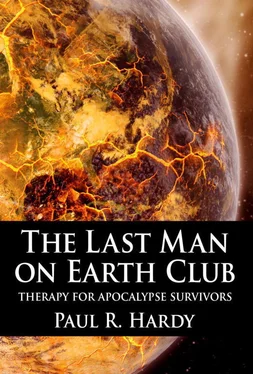Katie was an emotional palate cleanser after Liss, and I was relieved not to be dealing with someone liable to burst into tears, or to make any other kind of outburst — probably. She’d certainly had a few strange episodes, which could well have been seizures. There was also the question of whether she might be the one who broke out. She was certainly physically capable of the feats we’d seen, and possibly technically capable of hacking our systems. But if she really was seizing, that would argue against my suspicions. My most predictable patient was suddenly the least predictable of all.
Once she agreed to my request to sit down (she was content to stand unless specifically invited to sit), I went straight in with my concerns.
“Katie, I don’t know if you’re aware of it, but you seem to be having seizures.”
“I am unaware of any such symptoms.”
“We’ve observed several. Would you like to look at the videos?”
She turned her head slightly as I threw surveillance video up onto the wall. Each sequence showed one of Katie’s seizures, from various unflattering angles: she stood in shadow by the centre as Veofol spoke to her, but did not answer; she sat in the same chair she sat in now, staring without answering my questions; she spoke in a strange language in the trench at Kintrex and looked confused; she teetered on the edge of a staircase and turned only when Iokan called her name.
She studied them all carefully, but did not comment.
“You can see why I’m concerned,” I said.
She thought for a moment, her brow creasing. “These are not seizures. These are emotional disturbances.”
“Hm. Could you explain that, Katie?”
“They are an inherent part of my biological systems.”
“So this is nothing new?”
“It is a recurring symptom of the human mind.”
“And you experience this regularly?”
“Yes.”
“I’m not sure I agree with your diagnosis.”
“You are not a neurologist.”
“No, you’re right. And that’s why I’d like to get a neurologist involved.”
“Please explain.”
“I’d like to have your brain scanned more thoroughly during your next episode.”
“Please explain further.”
“Well, you’d be in a room with very sophisticated scanning equipment, probably in Hub Metro. Then we’d be able to monitor exactly what’s going on, and see if there’s anything we can do to help.”
She deliberated.
“No,” she said.
“You do understand that this could be a symptom of your neural degradation?”
“I am able to control my symptoms. I do not require your assistance.”
“And how exactly are you controlling the symptoms?”
She paused. “Through extremes of pleasure or pain. These concentrate the biological systems and reduce chaotic neural impulses.”
“And is that what Iokan helped you with?”
“Yes.”
“How exactly did he help?”
She paused again before speaking. “Privacy was activated. It is not necessary to divulge this information.”
“Can I presume you chose to control your symptoms with pleasure, rather than pain?”
She thought about that. “Yes.”
“Well, I’m glad you chose not to hurt yourself.”
“It was not necessary.”
“And Iokan was willing to help?”
“He had misgivings, but decided that since the procedure had medical value, his wife would not raise any objections.”
“His wife? So you had sex?”
Another pause. “Yes.”
“Okay… you know, if you really need this, we can always provide some, ah, equipment…”
“A human male is more effective.”
I was tempted to point out the obvious flaw in this reasoning, but wasn’t entirely sure she’d understand.
“Well. As long as he consents, I can’t see why I should stop you. But please consider using a substitute.”
“Your offer is noted.”
Something else occurred to me. If her neural state was deteriorating, perhaps she might respond differently to other stimuli. So I reached for the only available metric.
“I’d like to go back to another question entirely, if that’s all right with you.”
“I am willing to co-operate with therapy.”
“Yes. Well, I was wondering if you could tell me — how did you survive the extinction of your species?”
“I have divulged this information to you previously.”
“I’d like to hear it again, please.”
She paused, and thought hard. That crease in her brow went deeper than before. I checked my pad: if she was going to be consistent, if nothing had changed, then the first words out of her mouth would be: I was assigned to crew a modified orbital freight transport with two others.
After a moment, I had to prompt her. “Katie? Can you answer the question?”
“Yes.” A second more of pause, and then she spoke. “I was given command of an orbital freight transport with two others whose role it was to pilot the ship and control our weaponry.” I found myself smiling with satisfaction, but Katie did not notice. “We lay dead in space until the enemy ship approached and then we attacked. We intended to ram the enemy and detonate antimatter devices but they fired first and destroyed our ship. The others were killed. I was thrown clear from the wreckage. I engaged vacuum survival systems to reduce my heat signature, and consequently survived.”
It was precisely what I’d hoped for; instead of the usual repetition, she was paraphrasing and bringing in other elements of the experience. Some part of the disintegration of her mind was allowing her greater freedom. And perhaps her usual assertion that she had provided us with sufficient strategic and tactical information was gone as well.
“Was this your first battle?”
“I have already provided sufficient tactical and strategic information.”
Well, perhaps not. But I pressed on anyway. “I’m not interested in tactics or strategy, Katie. I’m interested in you . In how you saw things. Was it your first battle?”
She paused for a moment; I feared she would keep her silence. But then she continued. “No. I fought in many engagements.”
“Did you always lose?”
She paused to consider her answer. “78% of engagements ended in unacceptable losses.”
“So you lost a lot of battles?”
“Yes.”
“And you lost a lot of comrades?”
“Yes.”
“How did that feel?”
“I did not express emotion.”
“But did you feel emotion?”
“I experienced emotional disturbance.”
“How did you address that?”
A pause. “With the assistance of my fellow soldiers.”
“Did that help?”
“Defeats were not prevented.”
“I mean, did it help you? ”
“It helped me.”
“Can you tell me about one of these battles?”
She thought about that. She’d given us barely any information about the war, despite her assertion about sufficient tactical and strategic information being provided. Finding out more about what she’d endured and whom she’d fought could only help. She came to a decision after approximately five seconds.
“I fought in the defence of the Earth-Sun L2 station.”
“Was that an important battle?”
“Yes. It was our last outpost outside the Earth-Moon system. It provided a base to strike against the enemy.”
“What happened?”
“They approached from the Vesta asteroid chain. They were unable to make use of gravitational corridors due to unsuitable orbital positioning. Their approach was therefore slow and vulnerable to harassing attacks by fighters. The L2 base was our primary centre of operations. It was designed as a multi-role observatory platform but was repurposed for fighter production, repair and deployment. My primary role was as a fighter pilot. I made eighty-nine sorties against the enemy. Some of their smaller ships could be destroyed, disabled or forced to divert their course. Their capital ships could not be stopped. They were built within asteroids which could withstand all weapons except for direct nuclear or anti-matter detonation, but their defences were too effective for us to reach them. Nevertheless, we were able to mount four successful sorties which detonated weapons close enough to cause serious damage to one asteroid ship.”
Читать дальше












